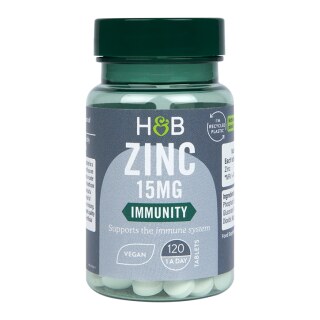Why should I take zinc?
- Cold & Flu: Zinc has become a popular treatment for the common cold. Some studies have found that zinc lozenges and zinc sulfate can reduce the duration of colds and the number of upper respiratory infections.
A 2017 meta-analysis published in the Open Forum Infectious Diseases found that people who took 80 to 92 mg of zinc a day got better faster. By day five, 70% of those who took zinc had recovered, compared to just 27% of those taking a placebo. It was also seen to potentially reduce the duration of colds by 2.25 days. This suggests that taking zinc supplements may reduce the overall burden of the common cold among healthy adults when given within 24 hours of the onset of symptoms.
- Diarrhea: Taking zinc orally reduces the duration and severity of diarrhea in malnourished children. Zinc dosage of 20 mg per day is the most common dose used. But doses of 5-10 mg also seem to work and cause less vomiting.
- Wilson's disease: An inherited disorder that causes copper to accumulate in many organs. Taking zinc orally improves symptoms of this condition, as zinc blocks the amount of copper that is absorbed, increasing the amount of copper the body releases.
- Depression: Taking zinc orally while taking antidepressants appears to improve depression. It may also help people who do not respond to treatment with antidepressants alone.
- Diabetes: Taking zinc orally may help improve blood sugar levels in people with diabetes.
Which are the zinc deficiency symptoms?
- Delayed development in children, e.g. low height, delayed development of sex characteristics.
- Loss of appetite.
- Changes in taste.
- Increased risk of infection.
- Fertility problems.
- Diarrhea.
- Disruption of immune response.
- Problems with wound healing.
- Damage to eyes and skin.
- Inability to concentrate.
How much zinc do I need per day?
Recommended Dietary Allowance (RDA) of zinc:
- CHILDREN 4-8 years 5 mg/day, 9-13 years 8 mg/day
- WOMEN: 8 mg/day
- PREGNANCY / BREASTFEEDING: 12 mg/day
- MEN: 14 years and over 11 mg/day
Dietary sources rich in zinc:
- Red meat
- Poultry
- Oysters
- Fortified foods
- Beans and nuts
- Fish (in particular sardines)
- Seafood
- Wholegrain cereals
What are the potential risks of taking zinc?
- Side effects: Zinc supplements may irritate the stomach and the mouth. Zinc lozenges may change your sense of smell and taste for a few days. If taken long term, zinc lozenges may lower copper levels in the body. Zinc nasal sprays used over a long period of time have been associated with transient loss of smell.
- Interactions: Zinc may interact with certain medications such as birth control pills and certain antibiotics. Zinc may also interact with other supplements such as calcium, magnesium, copper and iron.
- Risks: People who are allergic to zinc, have HIV or haemochromatosis should not take zinc supplements without first advising their doctor. Excessive zinc can cause fever, cough, nausea, decreased immune function, and metal imbalances. In pregnancy, high doses could cause harm to the fetus.
Conclusion
Zinc is the mineral with the highest concentration in the human body, following iron. It is a building block in many enzymes and is involved in many essential functions in the human body, contributing to the proper functioning of systems, such as the immune system and protecting the body from infections, viruses and diseases.
Zinc supplementation is ideal for winter, when the body needs a boost in the cold months to strongly support the immune system.
Scientific references
Hulisz D.(2003) Efficacy of zinc against common cold viruses: an overview. J Am Pharm Association. Sep-Oct;44(5):594-603.
Hemilä H. (2011) Zinc lozenges may shorten the duration of colds: a systematic review. Open Respir Med July;5:51-8.
Harri Hemilä (2011). Zinc Lozenges May Shorten the Duration of Colds: A Systematic Review. Open Respir Med June; 5: 51–58
Michelle Science, MD, Jennie Johnstone, MD, Daniel E. Roth, MD PhD, Gordon Guyatt, MD MSc, and Mark Loeb, MD MSc (2012). Zinc for the treatment of the common cold: a systematic review and meta-analysis of randomized controlled trials. Julυ 10; 184(10): E551–E561.
Maggini S, Beveridge S, Suter M. (2012) A combination of high-dose vitamin C plus zinc for the common cold. J Int Med Res.;40(1):28-42.
Singh M, Das RR. (2013) Zinc for the common cold. Cochrane Database Syst Rev. Jun 18;(6)
Wang MX, Win SS, Pang J. (2020) Zinc Supplementation Reduces Common Cold Duration among Healthy Adults: A Systematic Review of Randomized Controlled Trials with Micronutrients Supplementation. Am J Trop Med Hyg. July 103(1):86-99.



























